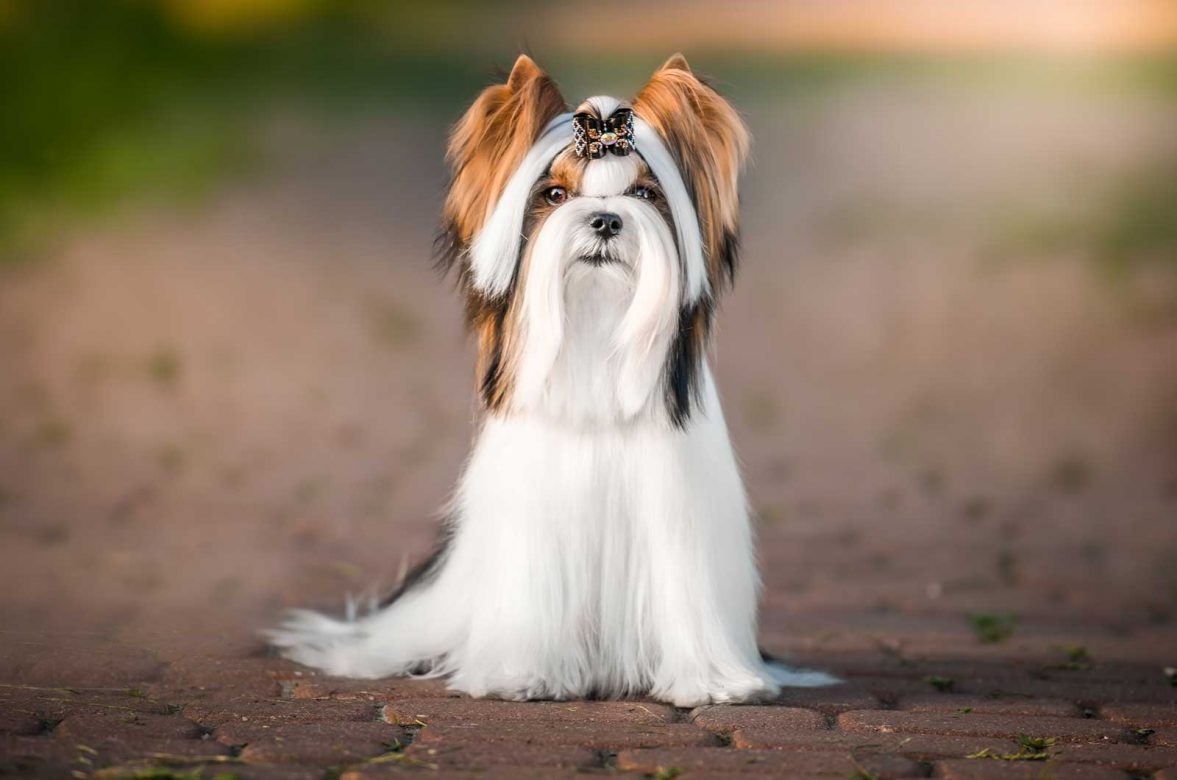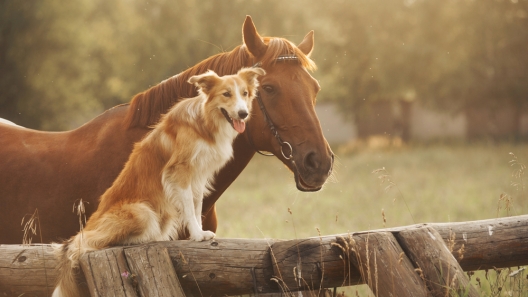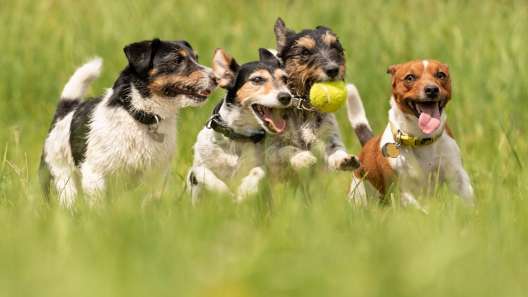-
Activity Level:
moderate
-
Shedding Level:
low
-
Grooming Level:
high
-
Trainability:
high
-
Good for Novice Owners:
high
-
Adaptability:
high
-
Kid/Pet Friendly:
often
-
Prey Drive:
high
-
Watchdog:
aware
- Average Size: Small
- Average Lifespan: 16 years
- Registered?: aca, akc
Biewer Terrier Dog Breed Information
Overview
Temperament
Adaptability
Health
Owner Experience
Grooming
Activity Level
Size
Life Span
Did You Know?
The Biewer Terrier, pronounced like “Beaver Terrier”, has an interesting past. They originated in Germany when Gertrud and Warner Biewer bred two Yorkshire Terriers with recessive piebald genes to create them.
After 20 years of a successful Yorkshire Terrier breeding program, they came across the two puppies with the rare piebald gene that isn’t normally found in Yorkies. These two black, white, and tan Yorkies were bred to create the first Biewer Terrier. From there, the Biewer Yorkshire Terrier was born and rose to popularity in the late 1980s in Germany.
Over time, the breed became known as the Biewer Terrier. Although their popularity in Germany fell by the year 2000, this dog breed had a resurgence in popularity once they were brought to the United States. Mars Veterinary conducted an extensive genetic study on the breed in 2009 to identify the breed signature.
The American Kennel Club recognized the Biewer Terrier in 2021 as a member of the Toy Group. They were also the first dog breed to be recognized as a purebred due to scientific advancements instead of pedigree documentation, which is the traditional method.
The Biewer Terrier is a playful, friendly dog that loves their families. They are often found performing amusing acts and antics to entertain their families. This is a toy-sized terrier that lives to love their families and be loved in return. As such, they thrive on attention and affection. Biewer Terriers also often maintain a puppy-like demeanor throughout their lives.
Well-socialized, they have a friendly disposition, which means they tend to get along with children, other dogs, and even warm up to strangers eventually. Due to their small size, these tiny terriers can be easily injured by the accidental rough play or falls that can be common with very young children. Because of this, they may be a better fit for families with older children who can handle this tiny dog carefully. Regardless, any playtime between children and these whimsical, energetic dogs should be closely supervised.
As a terrier, they can have a high prey drive and an urge to chase. So, if there are other small pets in the household, they may need some extra socialization and training with them. Although a Biewer Terrier can easily be trained into barking or learn to do it through a lack of training, they do not tend to bark a lot. They will alert you when there is company on the property, but do not tend to be a nuisance barker.
This is a highly adaptable dog breed. Biewer Terriers are a good fit for apartment living and will also adapt well to larger homes with room to run. They do well in most climates, but are sensitive to heat and cold.
Due to their small size, they may need to bundle up in the winter. Having some basic winter dog products on hand can help your small dog stay warm when the temperatures drop. Because these dogs love to be around people, they should not be left alone for long periods of time.
The Biewer Terrier is a relatively healthy dog breed. As with all dog breeds, there are some potential health issues to be aware of. For the Biewer Terrier, these can include sensitive digestive systems and luxating patella. Good breeding practices and the health of the parents make a big difference in the health of Biewer Terrier puppies.
Reputable breeders will screen their dogs to make sure they are not passing preventable issues to puppies. Make sure you ask the breeder about the health and genetic history of both parents. You can also ask about any health tests or clearances that have been done. The Biewer Terrier Club of America recommends DNA tests for progressive retinal atrophy and primary lens luxation as well as an ophthalmologist evaluation.
As a small dog breed, Biewer Terriers are also more prone to developing dental disease, especially gum disease. Gum disease in dogs is painful and can lead to a lot of other issues. This makes good dental care early and throughout their lives even more important.
Although terriers are known to sometimes have a stubborn streak, you generally won’t find it with the Biewer Terrier. There can always be exceptions to the rule, but a Biewer Terrier is generally a highly trainable dog breed that is a good fit for owners of all experience levels.
Their high intelligence and eagerness to please tend to mean they pick up on things easily. As a toy dog breed, they can take a little longer to train when it comes to housebreaking. But, following some basic house training tips and applying them consistently can go a long way in potty training this tiny pup.
The Biewer Terrier tends to have a tri-colored long coat that is black, white, and tan. They may shed minimally, but their long coat requires daily brushing to remove tangles and prevent mats. You can also get your Biewer groomed to have a short clip instead of a longer coat.
A short coat only needs to be brushed weekly or a few times a week. But, you will need to add in a few trips to the groomer throughout the year to maintain the shorter clip. Regardless of coat length, the Biewer Terrier only requires the occasional bath when needed to keep their coat looking great.
In addition to coat care, you will also need to take care of your Biewer Terrier’s nails, ears, and teeth. Once or twice monthly nail trimming is usually frequent enough to keep your dog’s nails from growing too long. But, if they aren’t wearing down as much naturally or just tend to grow quickly, you may need to cut your dog’s nails more often.
Checking ears regularly and carefully cleaning your dog’s ears as needed can help prevent ear infections. Or, if you see anything concerning, you can catch it early and get to the vet. When looking at your dog’s ears, you’re checking to make sure they are clean, dry, and free of debris or pests. If you see excess wax, off-color or smelly discharge, or irritation and redness, it’s time to visit the vet.
As a small dog breed, the Biewer Terrier is more prone to developing dental diseases like gum disease, tooth decay, and tooth loss later in life. Practicing good dental care for dogs can help prevent these painful issues later in life. Brushing your dog’s teeth or using an enzyme toothpaste every day is ideal. You can also work with your vet to identify safe dental hygiene chews and treats and to formulate a special “dental care diet” to help supplement your efforts.
Although the Biewer Terrier is tiny, they are also playful and energetic little dogs. Daily walks and some playtime are plenty for this small dog, but they will also often be up for more activity if you are.
They tend to be agile and easy-going dogs, so they may also enjoy trips to the dog park and other activities with you. However, they are small and can get tired easily, so keep an eye on them to make sure they are not overexerting themselves trying to keep up with you.
A fully-grown Biewer Terrier usually stands 7-11 inches tall and weighs 4-8 pounds.
Biewer Terriers generally live for 16 years on average.
One of the facts about Biewer Terriers is that the dog breed was originally called a German Yorkshire Terrier and a Biewer Yorkshire Terrier. Now, they are mostly called Biewer Terriers, Biewers, or BTs. But, they are also sometimes referred to as a Biewer á la Pom Pom, Biewer Yorkie, and Biewer Yorkshire.









